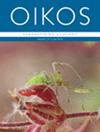Forest fragmentation effects on mutualistic interactions: frugivorous birds and fruiting trees
IF 3
2区 环境科学与生态学
Q2 ECOLOGY
引用次数: 0
Abstract
While many effects of forest fragmentation are reasonably well understood, knowledge of interspecific interactions in fragmented ecosystems is much more limited, particularly for high diversity tropical forests. Using nearly 40 years of data from the Biological Dynamics of Forest Fragments Project in Central Amazonia, we assessed whether forest fragment area and time since isolation impact mutualistic interactions between frugivorous birds and their food resources. We used structural equation modeling to analyze the complex pathways between four main variables determining these interactions: fruiting tree abundance, frugivorous bird abundance, forest fragment area, and time since fragment isolation. Our results confirm that fragment area alters the abundance of some tree resources, with successional plant families increasing in abundance with decreasing fragment size. However, these changes do not drive alterations in the abundance of frugivorous birds. We also tested if bird species with a greater relative diet breadth are less vulnerable to forest fragmentation and found that specialist frugivores are more vulnerable to forest fragmentation immediately after isolation but are not differentially impacted within the long term. Collectively, our results demonstrate the need to further evaluate human‐driven habitat change across multiple timescales to fully understand its impacts on complex species interactions.森林破碎化对互利互动的影响:食俭鸟和果树
虽然人们对森林破碎化的许多影响有了相当深入的了解,但对破碎化生态系统中种间相互作用的了解却有限得多,尤其是对高多样性热带森林而言。利用中亚马孙森林破碎带生物动力学项目近 40 年的数据,我们评估了森林破碎带面积和隔离以来的时间是否会影响食俭鸟类与其食物资源之间的相互影响。我们使用结构方程模型分析了决定这些相互作用的四个主要变量之间的复杂路径:果树丰度、食俭鸟丰度、森林破碎带面积和破碎带隔离以来的时间。我们的结果证实,破碎带面积会改变某些树木资源的丰度,随着破碎带面积的减小,演替植物科的丰度也会增加。然而,这些变化并没有改变食俭鸟类的丰度。我们还测试了相对食性更广的鸟类物种是否更不容易受到森林破碎化的影响,结果发现,专食俭朴的鸟类在被隔离后更容易受到森林破碎化的影响,但在长期内并没有受到不同程度的影响。总之,我们的研究结果表明,有必要进一步评估人类驱动的栖息地变化的多个时间尺度,以充分了解其对复杂物种相互作用的影响。
本文章由计算机程序翻译,如有差异,请以英文原文为准。
求助全文
约1分钟内获得全文
求助全文
来源期刊

Oikos
环境科学-生态学
CiteScore
6.20
自引率
5.90%
发文量
152
审稿时长
6-12 weeks
期刊介绍:
Oikos publishes original and innovative research on all aspects of ecology, defined as organism-environment interactions at various spatiotemporal scales, so including macroecology and evolutionary ecology. Emphasis is on theoretical and empirical work aimed at generalization and synthesis across taxa, systems and ecological disciplines. Papers can contribute to new developments in ecology by reporting novel theory or critical empirical results, and "synthesis" can include developing new theory, tests of general hypotheses, or bringing together established or emerging areas of ecology. Confirming or extending the established literature, by for example showing results that are novel for a new taxon, or purely applied research, is given low priority.
 求助内容:
求助内容: 应助结果提醒方式:
应助结果提醒方式:


